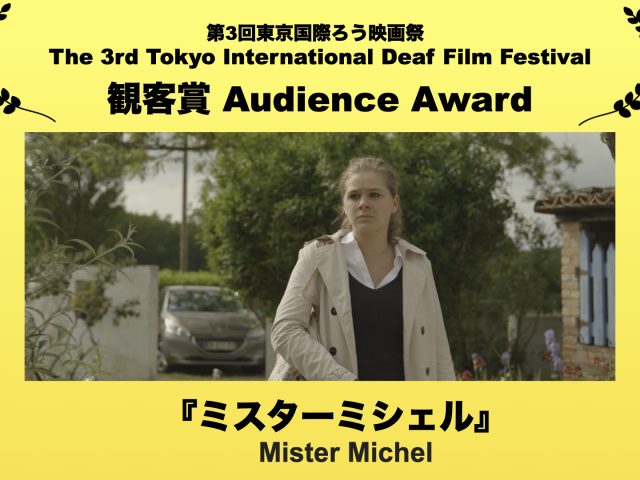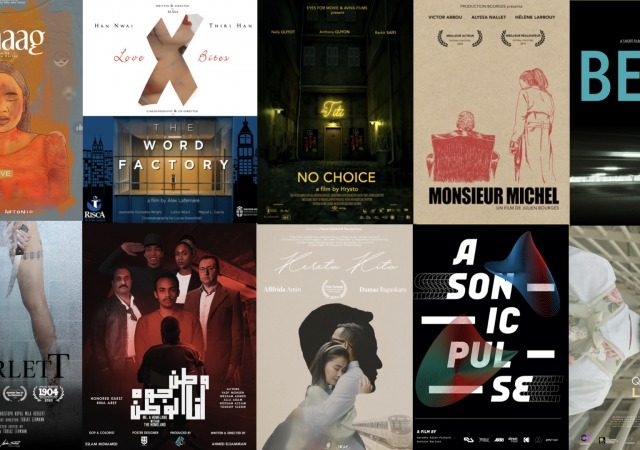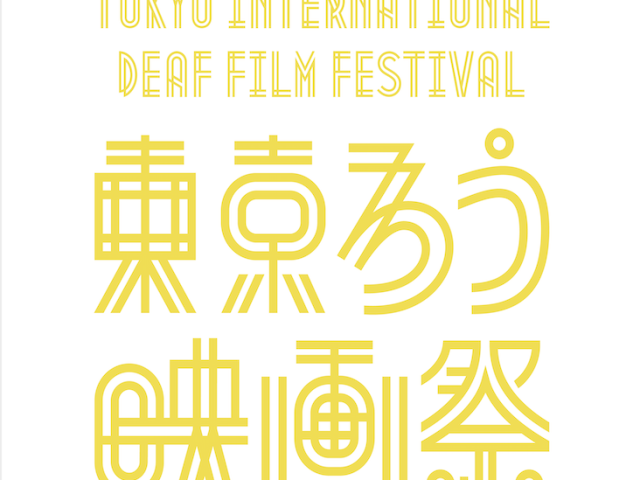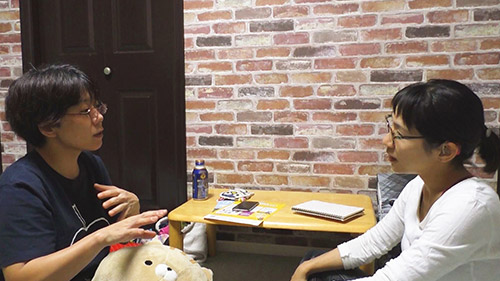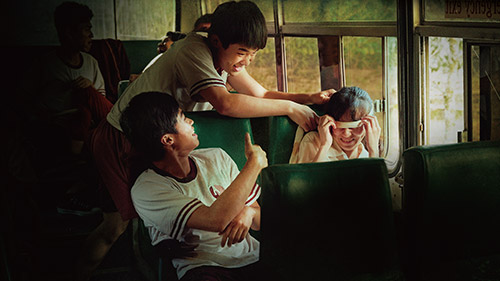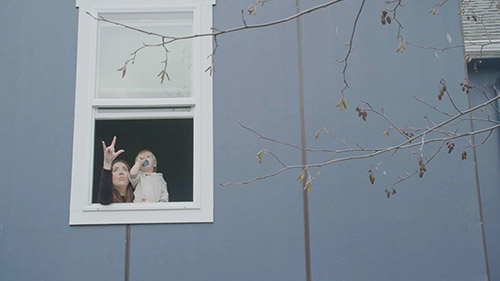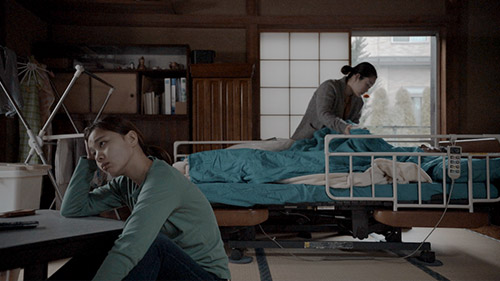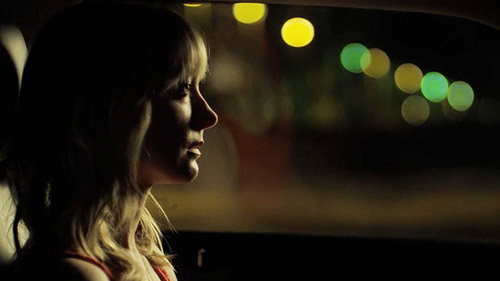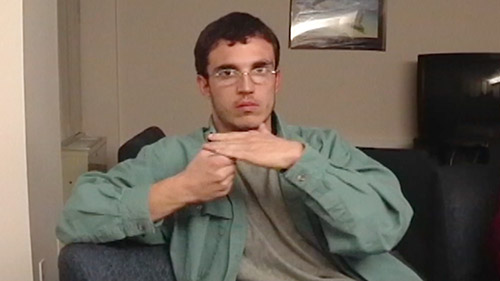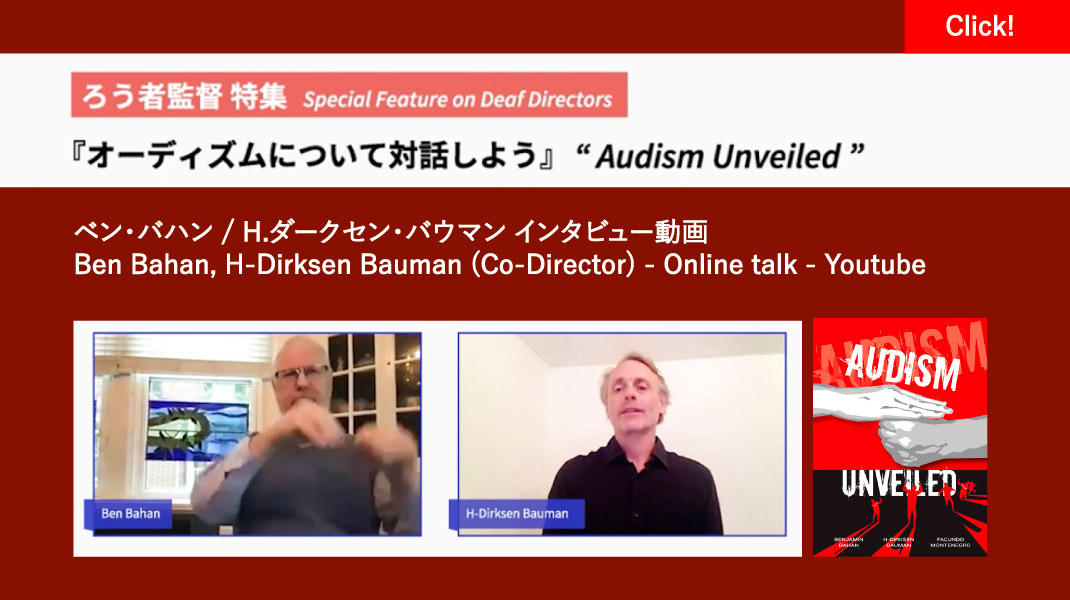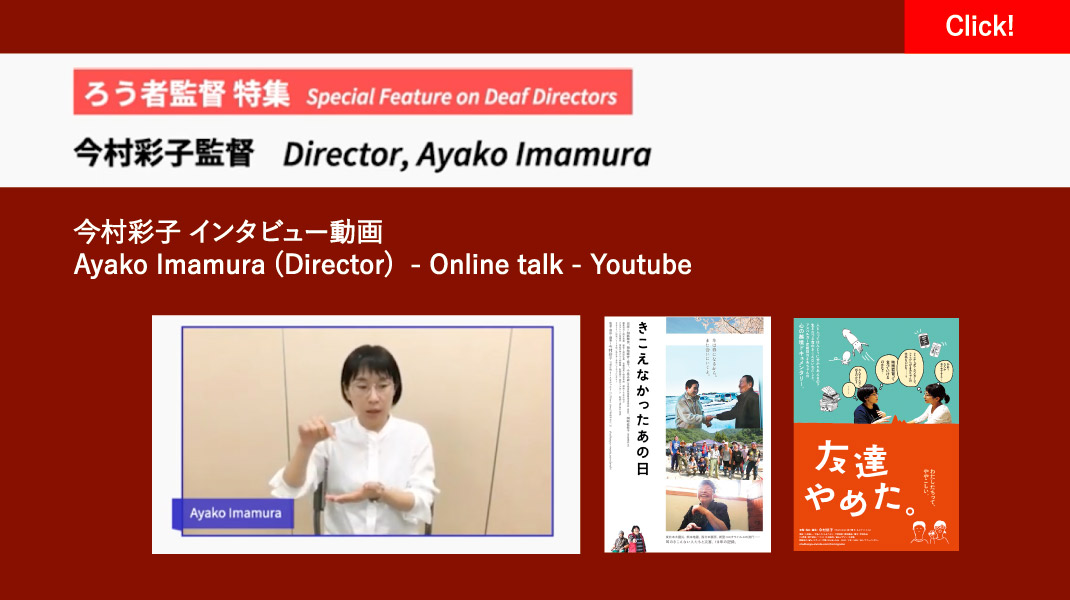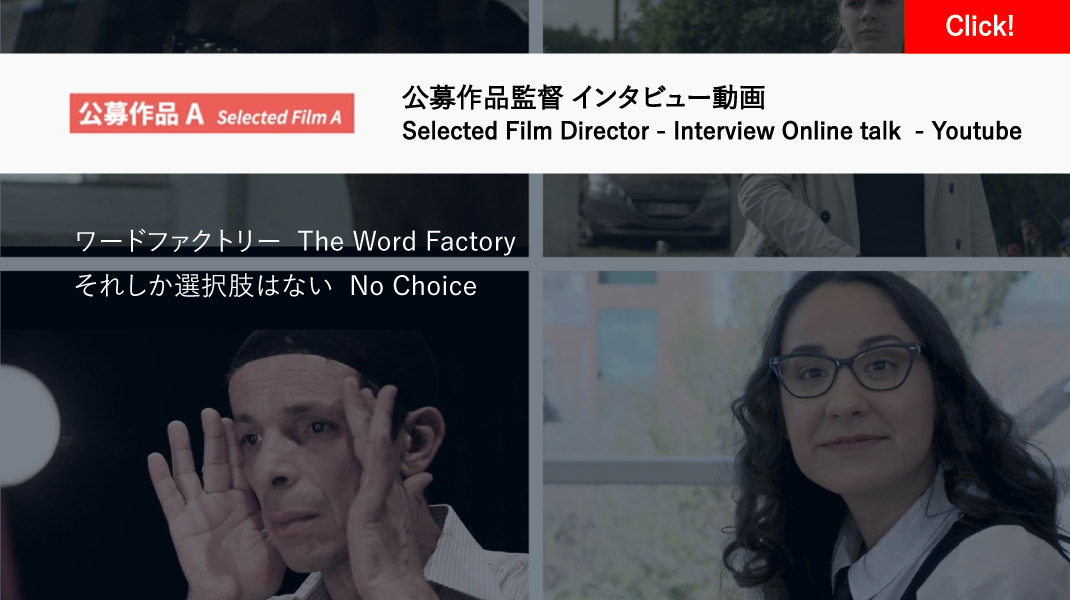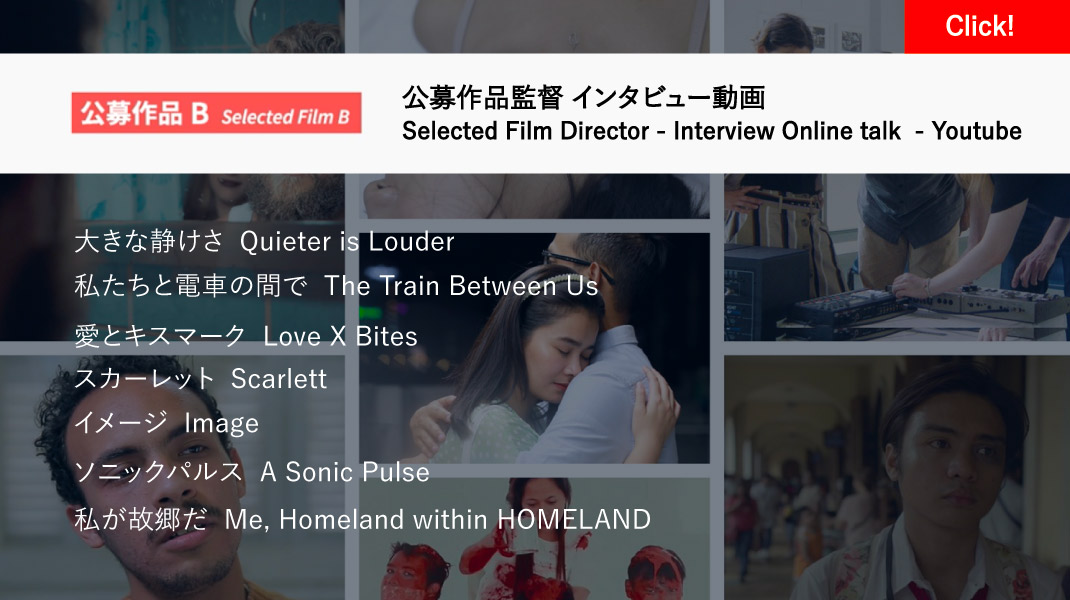

INTERVIEW
Interviews were conducted with various Deaf directors, and directors of selected films submitted from the public entries.
They will be available to watch from December 4th, 10:30 am to December 12th, 8 pm.
(Japanese Sign Language, American Sign Language, International Sign, Japanese subtitles and English subtitles provided)
They will be available to watch from December 4th, 10:30 am to December 12th, 8 pm.
(Japanese Sign Language, American Sign Language, International Sign, Japanese subtitles and English subtitles provided)
The 3rd Tokyo International Deaf Film Festival was held in both in-person and online formats!
From a Deaf perspective, a range of topical works from the past to the present was showcased.
From a Deaf perspective, a range of topical works from the past to the present was showcased.
Since 2017, the Tokyo International Deaf Film Festival has been held every two years. 2021 was the third time it has been held. The Covid-19 pandemic brought challenges, but the film festival was held successfully by taking countermeasures such as reducing the scale of venue screenings, and moving part of the film festival to online screenings for the first time ever. This time, screenings took place in-person at the venue, Euro Live Shibuya, on December 4-5, 2021 and online for 9 days from December 4-12, 2021. About 2000 spectators from all over Japan and around the world participated.
Thank you for your participation and support for the 3rd Tokyo International Deaf Film Festival.
We have prepared a compilation video that reviews the highlights of the 3rd Tokyo International Deaf Film Festival, so please be sure to watch it.
We look forward to seeing all of you again in 2 years.
Thank you for your participation and support for the 3rd Tokyo International Deaf Film Festival.
We have prepared a compilation video that reviews the highlights of the 3rd Tokyo International Deaf Film Festival, so please be sure to watch it.
We look forward to seeing all of you again in 2 years.
Information Accessibility
・All works will have both Japanese and English subtitles (except the film, ”Sasaki in My Mind”, which will have Japanese subtitles only).
・We will prepare interpretation services in spoken Japanese, Japanese Sign Language, and Japanese subtitles for all events. We will offer interpretation services in International Sign, American Sign Language, and English subtitles as well.
Program
We have prepared a program guide in PDF format for the 3rd Tokyo International Deaf Film Festival.
Please download it below.
Screening schedule:
Announced on October 15 (Friday)
Announced on October 15 (Friday)
We have prepared a schedule for the venue screening, online screening, special events, and talks in PDF format.
Please download it below.
Tickets
Explanation
・All works will have both Japanese and English subtitles.・You can choose to watch short features with an Japanese audio guide.
・The time of each screening is fixed. However, you have 72 hours from the screening start time to watch the film. Once each screening has started, you will not be able to buy tickets for that film.
・For special events, the streaming is in real time. You must watch the event live (it is different from the 72 hour period available to watch film screenings).
・If you purchased advance tickets, you must complete payment before the screening day. If you purchased same-day tickets, you must complete payment before 10 minutes prior to the screening start. If payment is not completed by the deadline in either case, the ticket will be automatically cancelled.
・Tickets cannot be refunded, exchanged, or reissued.
・Film screenings, screening times, guest speakers, schedule, and the streaming period are subject to change without notice.
[Regarding the test viewing of online screening]
If you would like to check if online viewing is available before purchasing tickets, we will release a test video page on the link below. Please refer to the page before purchase.
If you would like to check if online viewing is available before purchasing tickets, we will release a test video page on the link below. Please refer to the page before purchase.
Film program
About the film screenings
We have prepared a program guide in PDF format for the 3rd Tokyo International Deaf Film Festival. Please download it below.・In general, the English page only shows online screenings and special events that can be viewed from anywhere in the world.
・If you are purchasing a ticket for the in-person screening, or an online screening work for which online streaming is limited to Japan, please see the details on the Japanese version of the in-person and online streaming ticket pages, and purchase at PassMarket (Japanese language only). If you need assistance in English, please contact tdfstaff2021@gmail.com.
The following only shows films that have the permission to be streamed from anywhere in the world, as well as online events (There are differences between the list of films that can be seen worldwide versus those that are limited to Japan only).
Old Long Stay

Director: Yuki Iiyama
2020/Japan/Japanese Sign Language, Japanese/ Japanese subtitles, English subtitles/170 mins
2020/Japan/Japanese Sign Language, Japanese/ Japanese subtitles, English subtitles/170 mins
Despite being born and raised in Japan, having paid taxes, and naturalized, they are not able to receive the minimum guaranteed pension. In March 2000, seven Deaf Zainichi-Koreans file suit in the Kyoto District Court protesting unreasonable discrimination that foreign nationals above a certain age and who have a disability are not able to receive disability pensions. Through interviews with the plaintiff and supporters, and past documentaries, the director brings us face to face with historical and political issues of “disability” and “ethnicity”. Produced and screened at Yokohama Triennale 2020.
Advance tickets ¥1500,Same-day tickets ¥1700
Online : worldwide
1st screening: 12/4 (Saturday) 10:30 JST(available for 72 h)
2nd screening: 12/7 (Tuesday) 21:00 JST (available for 72 h)
3rd screening: 12/9 (Thursday) 20:00 JST (available for 72 h)
1st screening: 12/4 (Saturday) 10:30 JST(available for 72 h)
2nd screening: 12/7 (Tuesday) 21:00 JST (available for 72 h)
3rd screening: 12/9 (Thursday) 20:00 JST (available for 72 h)
Short Features
Feeling Through

Director: Doug Roland
2019/USA/American Sign Language, English/ Japanese subtitles, English subtitles/19 mins
2019/USA/American Sign Language, English/ Japanese subtitles, English subtitles/19 mins
While walking through the streets of New York after a party, a young boy has a chance encounter with DeafBlind man asking for help. The two end up sticking together through the night and an unexpected friendship develops. Nominated for the 2021 Academy Award for Best Short Film, Marlee Matlin, a Deaf actor who was cast as the leading role in “Children of a Lesser God”, is executive producer.
This is Normal

Director: Ryan Welsh, Justin Giddings
2013/USA/American Sign Language, English/ Japanese subtitles, English subtitles/20 mins
2013/USA/American Sign Language, English/ Japanese subtitles, English subtitles/20 mins
Growing up surrounded by hearing people, a young woman, who can’t hear, struggles to fit into the Deaf community. However, the film’s exploration of what is “normal” will find both supporters and detractors in the audience. Adopting or rejecting the Deaf identity and the conflict between, this short drama explores her search for an identity to call her own.
Double Discrimination

Director: Rinkoo Barpaga
2014/United Kingdom/British Sign Language/ Japanese subtitles, English subtitles, Japanese audio guide/27 mins
2014/United Kingdom/British Sign Language/ Japanese subtitles, English subtitles, Japanese audio guide/27 mins
Deaf director, Rinkoo, who is Asian, interviews members of the Deaf community about their experience with racism. Black and Asian Deaf people say they are targets of racism, whereas white Deaf people say they have not seen such racism. This short documentary confronts the hierarchy that exists in Deaf society
Advance tickets ¥1300,Same-day tickets ¥1500
Online : worldwide
1st screening: 12/4 (Saturday) 10:30 JST(available for 72 h)
2nd screening: 12/7 (Tuesday) 21:00 JST (available for 72 h)
3rd screening: 12/9 (Thursday) 20:00 JST (available for 72 h)
1st screening: 12/4 (Saturday) 10:30 JST(available for 72 h)
2nd screening: 12/7 (Tuesday) 21:00 JST (available for 72 h)
3rd screening: 12/9 (Thursday) 20:00 JST (available for 72 h)
I quit, being "friends"

Director: Ayako Imamura
2020/Japan/Japanese Sign Language, Japanese/ English subtitles, Japanese subtitles/84 mins
2020/Japan/Japanese Sign Language, Japanese/ English subtitles, Japanese subtitles/84 mins
Due to Asperger’s, Ma-chan finds it tiring to be perceptive to other people’s feelings and finds it hard to deal with people. Director Ayako Imamura, who is born deaf, shows an understanding face, but is inwardly conflicted. When the relationship between the two becomes strained over trivial things, the camera is turned, the director being worried over who bears responsibility for the problem. Screened at Aichi International Women’s Film Festival and Nippon Connection Film Festival, Germany.
Advance tickets ¥1000,Same-day tickets ¥1200
Online : worldwide
1st screening: 12/4 (Saturday) 10:30 JST(available for 72 h)
2nd screening: 12/7 (Tuesday) 21:00 JST (available for 72 h)
3rd screening: 12/9 (Thursday) 20:00 JST (available for 72 h)
1st screening: 12/4 (Saturday) 10:30 JST(available for 72 h)
2nd screening: 12/7 (Tuesday) 21:00 JST (available for 72 h)
3rd screening: 12/9 (Thursday) 20:00 JST (available for 72 h)
Silence on that Day

Director: Ayako Imamura
2021/Japan/Japanese Sign Language, Japanese/ English subtitles, Japanese subtitles/116 mins
2021/Japan/Japanese Sign Language, Japanese/ English subtitles, Japanese subtitles/116 mins
Nearly 10 years has passed since the documentary, “The Connecting Bridge”, was announced in 2013 about Deaf people and the 2011 Tohoku earthquake and tsunami. Immediately after the earthquake occurred, Director Ayako Imamura, visiting Miyagi prefecture, was determined to let people know about the situation of Deaf people living there. Since then, she has continued to visit Miyagi prefecture as well as other areas affected by natural disasters such as the Kumamoto earthquake, West Japan flooding, and more recently, the Covid-19 pandemic to record the plight of the Deaf, and intends to do so until the day that everyone can live safely. This film is a 10 year record of the Deaf and how they cope with natural disasters.
Advance tickets ¥1000,Same-day tickets ¥1200
Online : worldwide
1st screening: 12/4 (Saturday) 10:30 JST(available for 72 h)
2nd screening: 12/7 (Tuesday) 21:00 JST (available for 72 h)
3rd screening: 12/9 (Thursday) 20:00 JST (available for 72 h)
1st screening: 12/4 (Saturday) 10:30 JST(available for 72 h)
2nd screening: 12/7 (Tuesday) 21:00 JST (available for 72 h)
3rd screening: 12/9 (Thursday) 20:00 JST (available for 72 h)
Ayako Imamura (Director) - Online talk - Online streaming
Until Rainbow Dawn followed

Director: Mika Imai
2018/Japan/Japanese Sign Language, Japanese/ English subtitles, Japanese subtitles/63 mins
2018/Japan/Japanese Sign Language, Japanese/ English subtitles, Japanese subtitles/63 mins
Hana and Ayumi, both Deaf, meet at a sign language circle. Attracted to the same sex for the first time, Hana decides to begin a relationship with Ayumi, who is still unsure. However, when Hana tells her parents about the relationship, she is rejected by her mother. Despite Hana’s shock over her mother’s attitude, Ayumi is persistent and invites her to a gathering of Deaf LGBTQ. The people she meets, though grappling with troubles of their own, are forward-looking and positive about the future. Depicted by a Deaf director, in full sign language, this is a heart-warming tale of Deaf and LGBTQ intersectionality.
Advance tickets ¥1000,Same-day tickets ¥1200
Online : worldwide
1st screening: 12/4 (Saturday) 10:30 JST(available for 72 h)
2nd screening: 12/7 (Tuesday) 21:00 JST (available for 72 h)
3rd screening: 12/9 (Thursday) 20:00 JST (available for 72 h)
1st screening: 12/4 (Saturday) 10:30 JST(available for 72 h)
2nd screening: 12/7 (Tuesday) 21:00 JST (available for 72 h)
3rd screening: 12/9 (Thursday) 20:00 JST (available for 72 h)
We were there…we are here

Production: Boğaziçi University - The SIGN-HUB team
2020/Europe/Various sign languages/Japanese subtitles, English subtitles/42 mins
2020/Europe/Various sign languages/Japanese subtitles, English subtitles/42 mins
The SIGN-HUB project researches the history and sign languages of the Deaf community in Europe, and this film showcases interviews with several elderly Deaf people. A variety of sign languages are represented, including Catalan, French, German, Israeli, Italian, Dutch, Spanish, and Turkish sign languages. From each sign language community, the interviewer asks about their personal stories, work, education, and major events that they have experienced.
Free of charge
Online : worldwide
1st screening: 12/4 (Saturday) 10:30 JST(available for 72 h)
2nd screening: 12/7 (Tuesday) 21:00 JST (available for 72 h)
3rd screening: 12/9 (Thursday) 20:00 JST (available for 72 h)
1st screening: 12/4 (Saturday) 10:30 JST(available for 72 h)
2nd screening: 12/7 (Tuesday) 21:00 JST (available for 72 h)
3rd screening: 12/9 (Thursday) 20:00 JST (available for 72 h)
Events
Tokyo International Deaf Film Festival will hold symposia and online talks in connection with films being screened.
Documentary and Deaf
Date: 2021/12/10 (Friday) 20:30-22:00 JST
Online streaming, preregistration required, participation free of charge
Online streaming, preregistration required, participation free of charge
The word “Documentary” has several definitions, of which one is a recorded movie. It is a valuable medium for capturing sign language usage from both Deaf and hearing people.
In this round table, we have invited directors, Ayako Imamura (Deaf), Su Qing (SODA - Siblings of Deaf Adults/Children - who has a Deaf brother), and Itaru Matsui (Hearing) together to ask them what they have been looking at through the camera? From various perspectives, we will discuss recording the world of deafness through documentaries.
In this round table, we have invited directors, Ayako Imamura (Deaf), Su Qing (SODA - Siblings of Deaf Adults/Children - who has a Deaf brother), and Itaru Matsui (Hearing) together to ask them what they have been looking at through the camera? From various perspectives, we will discuss recording the world of deafness through documentaries.
Accessibility: Japanese Sign Language, American Sign Language, International Sign, Japanese subtitles, English subtitles. Audio will be in Japanese only.
Speakers

Ayako Imamura
Born in Aichi prefecture, she graduated from Aichi University of Education and since 20 years old, has been producing and screening documentaries, as well as giving lectures on them. Main works include “The Connecting Bridge” (2013), “Start Line” (2016), “I quit, being friends” (2020), and “Silence on that day” (2021) as well as publishing ”Days following the Start Line” (2019).

Su Qing
Born in Mongolia, in 1990, he earned a railroad design degree and began work as an art creator and editor at a Beijing advertising company, while also being a director at a television film production company. After going independent, he has worked on numerous documentaries. Main works include “White Tower” (2004), “Sign Language Time” (2010), and “Caro Mio Ben (My Dear Beloved)” (2017).

Itaru Matsui
He produces documentaries with the motto of “listening to hard-to-hear voices”. Together with the subjects of his documentaries, he works to change the world views of everyone for the better. For the film, “Tokyo Little Nero”, which shows Tokyo amid Covid-19, he received the Poverty Journalist Award and the Galaxy Award (Encouragement Award). Through the video festival, DOCU Memento, he provides a platform for unnamed people to tell unknown stories. Main works include “Only I Can Hear” (2021).
Behind the Scenes of Deaf Movie Subtitles
Date: 2021/12/9 (Thursday) 20:00-21:30 JST
Online streaming, preregistration required,
participation free of charge
Online streaming, preregistration required,
participation free of charge

What does it take to create subtitles and audio guides for the films screened at Tokyo International Deaf Film Festival? In this event, we ask the subtitle creators to discuss what happens behind the scenes. The mixture of sign language and spoken language causes unique difficulties that requires special techniques to handle. They will share with the audience how to achieve better accessibility while also preserving the intention of the creators.
Accessibility: Japanese Sign Language, American Sign Language, International Sign, Japanese subtitles, English subtitles. Audio will be in Japanese only.
Speakers
Shoko Yamagami
Managing director at Palabra Inc, which seeks to make barrier free movies with an awareness of the needs of the target audience as well as the intentions of the creator. Palabra has worked on the subtitles and audio guide production for films such as, “Drive My Car” (2021), “MINAMATA” (2020), and “I Fell in Love Like A Flower Bouquet” (2021).
Tariho Maruyama
Movie subtitle translator and sign language interpreter. Main films worked on include “Monsieur Hire” (1989), “J'avancerai vers toi avec les yeux d'un sourd” (2015), and “The Truth” (2019).
Akiko Sakamoto
Creator of barrier-free subtitles, audio guide descriptions, and film translations for mainly broadcast television.
Maki Shima
Creator of barrier-free subtitles and film translations for a wide variety of broadcast media including anime, professional wrestling, and historical dramas.
Eri Makihara
Director of Tokyo International Deaf Film Festival. Eri has worked with numerous films to evaluate works from the perspective of the Deaf. At TDF, she brings a Deaf perspective to checking the subtitles of screened films.
Tokyo International Deaf Film Festival Forum 2021
Date: 2021/12/11 (Saturday) 14:00-16:00 JST
Online streaming, preregistration required, participation free of charge
Subsidy: Arts Council Tokyo (Tokyo Metropolitan Foundation for History and Culture)
Online streaming, preregistration required, participation free of charge
Subsidy: Arts Council Tokyo (Tokyo Metropolitan Foundation for History and Culture)


This session looks back at the past activities and journey of the TDF until the present day by members of the TDF Executive Committee. In addition, we will screen works produced by the participants of the Deaf Film Production Workshop 2021 Basic Course. Especially in light of Covid-19, what is the purpose of film festivals, and how do we continue to produce and promote films? The executive committee discusses future prospects and challenges of the TDF.
Accessibility: Japanese Sign Language, American Sign Language, International Sign, Japanese subtitles, English subtitles. Audio will be in Japanese only.
How to register: Please access the registration form through the URL or QR code below.
How to register: Please access the registration form through the URL or QR code below.
Closing Ceremony (Online)
Date: 2021/12/12 (Sunday) 20:00-20:30 JST
Online streaming, participation free of charge
Online streaming, participation free of charge
You can decide with your vote!
Announcement of the winner of the 3rd Tokyo International Deaf Film Festival Audience Award.
List of works - to be announced
Announcement of the winner of the 3rd Tokyo International Deaf Film Festival Audience Award.
List of works - to be announced
Explanation
・For special events, the streaming is in real time. You must watch the event live (it is different from the 72 hour period available to watch film screenings).・If you registered same-day tickets, you must register before 10 minutes prior to the streaming start.
・Guest speakers, schedule, and the streaming period are subject to change without notice.
Screening schedule
We have prepared a schedule for the venue screening, online screening, special events, and talks in PDF format.
Please download it below.
Please download it below.
General
・Screening, film, screening times, guest speakers, schedule, and streaming times are subject to change without notice. For the latest information, please see the festival website for the 3rd Tokyo International Deaf Film Festival (https://www.tidff.tokyo/).
・All works will have both Japanese and English subtitles (except the film, ”Sasaki in My Mind”, which will have Japanese subtitles only).
・Short features will have a Japanese audio guide available (transmitted over FM radio at the venue).
・All works will have both Japanese and English subtitles (except the film, ”Sasaki in My Mind”, which will have Japanese subtitles only).
・Short features will have a Japanese audio guide available (transmitted over FM radio at the venue).
In-person screenings at the venue
・You must leave the theatre at the end of each screening, even if you plan to attend screenings or events consecutively. All seats are reserved. You may enter the theatre starting from 10 minutes before each screening.
・Please refrain from bringing infants or preschoolers with you to the venue.
・Please refrain from bringing infants or preschoolers with you to the venue.
Online screenings
・For the film “BOLI”, tickets are available in limited quantities and distribution will conclude when the capacity is reached.
・Depending on the film, there may be restrictions on which country you can watch the film from. If you live overseas, please see the information in English on the festival website. (For information on how to buy tickets outside Japan, please visit this URL)
・The time of each screening is fixed. However, you have 72 hours from the screening start time to watch the film. Once each screening has started, you will not be able to buy tickets for that film.
・During the film festival period, videos of talks are available free of charge.
・Symposiums require preregistration.
・Depending on the film, there may be restrictions on which country you can watch the film from. If you live overseas, please see the information in English on the festival website. (For information on how to buy tickets outside Japan, please visit this URL)
・The time of each screening is fixed. However, you have 72 hours from the screening start time to watch the film. Once each screening has started, you will not be able to buy tickets for that film.
・During the film festival period, videos of talks are available free of charge.
・Symposiums require preregistration.
Q&A
General
Q
Where will the festival be held?
A
It will be held at Euro Live Shibuya. Online screenings will be held at the same time.
▼In-person venue
Euro LiveKINOHAUS 2F 1-5 Maruyama-cho, Shibuya Tokyo, 150-0044, Japan
Closest station:Shibuya Station (about 8 minutes walk)
ACCESS(Japanese language)
Q
Is the Festival accessible?
A
Yes, we will prepare interpretation services in spoken Japanese, Japanese Sign Language, and Japanese subtitles for all events. We will offer interpretation services in International Sign, American Sign Language, and English subtitles as well.
Venue
Q
Does the venue have wheelchair access?
A
The theater is barrier free and wheelchair-accessible. A wheelchair space and accessible restroom is available. You can use the elevator to come up to the second floor.
Q
Are assistance dogs allowed in the venue?
A
Yes, they are allowed to enter in the theater with you.
Q
Is there a childcare space in the venue?
A
Infants and pre-school children are not allowed to enter the theater. School aged children and above may generally attend screenings except for films with age restrictions.
Q
How do I use the Smartphone “Mogiri” advance tickets or same-day tickets?
A
“Mogiri” tickets are activated by sliding on the smartphone screen. Please see here(Japanese language) for a guide on how to use “Mogiri” tickets.
Q
What do I if I can’t show my e-Ticket because my phone/tablet isn’t working or is out of battery?
A
We apologize for the inconvenience, but please charge your phone or borrow a friend’s device. If this is not possible, please inquire at the reception.
About
Message from the Director
Amid the Covid-19 pandemic, we have been searching and preparing for a better way to hold the 3rd Tokyo International Deaf Film Festival for everyone involved.
As a result, for the first time, we will be holding online screenings in addition to in-person screenings at the venue. Films will screen in-person at Euro Live Shibuya on December 4th and 5th, but online screenings will continue for a full 9 days until December 12th. By making available films about the rich and varied diversity of the Deaf to people all over the world in both formats, it is out hope that we can bring together new ideas in unexpected and exciting ways.
The theme for 2021 is “Otherness”.
Many different people all live together in this world. In our own daily lives, we come face to face with these differences all the time. What would you do if you encountered something or someone that was strange or unfamiliar to you? What makes you different compared to everyone else? TDF2021 will showcase a variety of films that seek answers to these questions.
In total, we received 41 unique, vibrant, and ambitious entries, the most ever in our history. All the films selected by our Deaf staff are ones that have the feeling of a bigger and more promising future. Please take this opportunity to enjoy these selected films from a Deaf perspective.
As a result, for the first time, we will be holding online screenings in addition to in-person screenings at the venue. Films will screen in-person at Euro Live Shibuya on December 4th and 5th, but online screenings will continue for a full 9 days until December 12th. By making available films about the rich and varied diversity of the Deaf to people all over the world in both formats, it is out hope that we can bring together new ideas in unexpected and exciting ways.
The theme for 2021 is “Otherness”.
Many different people all live together in this world. In our own daily lives, we come face to face with these differences all the time. What would you do if you encountered something or someone that was strange or unfamiliar to you? What makes you different compared to everyone else? TDF2021 will showcase a variety of films that seek answers to these questions.
In total, we received 41 unique, vibrant, and ambitious entries, the most ever in our history. All the films selected by our Deaf staff are ones that have the feeling of a bigger and more promising future. Please take this opportunity to enjoy these selected films from a Deaf perspective.
Eri Makihara, Director
Tokyo Deaf Film Festival Executive Committee
Tokyo Deaf Film Festival Executive Committee
About the Tokyo International Deaf Film Festival
The Tokyo International Deaf Film Festival is a film festival where all the films are selected by Deaf staff. It is held every 2 years in Shibuya, Tokyo by both Deaf and hearing staff altogether.
Our film festival screens films with Deaf themes that are mainly medium-length and feature-length films. By bringing to the forefront the unique perspectives of the Deaf and sign language users, as well as Deaf culture, society can deepen its understanding and appreciate the richness of Deaf society, art, and values. Our contribution is to broaden the perspectives and work towards strengthening the values of the society we all live in.
The film screenings are held alongside a wide-range of events such as after-screening talks, symposiums and workshops with invited guests from all over Japan and around the world. Both film screenings and events are staffed with sign language interpreters as well as accompanied by subtitles for barrier-free access to information.
The 3rd Tokyo International Deaf Film Festival will be held from December 4-12, 2021 in both in-person and online formats. A wide variety of works from all over the world, including works that are being screened for the first time in Asia and works that have not yet been released in Japan, are included. We will provide expanded accessibility in International Sign, American Sign Language, and multilingual support via voice recognition applications.
Our film festival screens films with Deaf themes that are mainly medium-length and feature-length films. By bringing to the forefront the unique perspectives of the Deaf and sign language users, as well as Deaf culture, society can deepen its understanding and appreciate the richness of Deaf society, art, and values. Our contribution is to broaden the perspectives and work towards strengthening the values of the society we all live in.
The film screenings are held alongside a wide-range of events such as after-screening talks, symposiums and workshops with invited guests from all over Japan and around the world. Both film screenings and events are staffed with sign language interpreters as well as accompanied by subtitles for barrier-free access to information.
The 3rd Tokyo International Deaf Film Festival will be held from December 4-12, 2021 in both in-person and online formats. A wide variety of works from all over the world, including works that are being screened for the first time in Asia and works that have not yet been released in Japan, are included. We will provide expanded accessibility in International Sign, American Sign Language, and multilingual support via voice recognition applications.
【Organizer/Management】Tokyo Deaf Film Festival Executive Committee
【Assistance】Agency for Cultural Affairs, ARTS for the future!(AFF)
【Subsidy】Arts Council Tokyo (Tokyo Metropolitan Foundation for History and Culture)
【Sponsor】Palabra Inc. / ShamrockRecords Inc. (Developer of UDTalk) / Hakuhodo DY I.O Inc.
【Support】Japanese Federation of the Deaf / Tokyo Federation of the Deaf / University of Tokyo, Research Center for Advanced Science and Technology, Kumagaya Laboratory
【Partner】Shizuoka Cannes Film Project Executive Committee
【Advertising Cooperation】General Incorporated Association Video Culture Innovation Organization
【Cooperation】NPO Theatre Accessibility Network
【Assistance】Agency for Cultural Affairs, ARTS for the future!(AFF)
【Subsidy】Arts Council Tokyo (Tokyo Metropolitan Foundation for History and Culture)
【Sponsor】Palabra Inc. / ShamrockRecords Inc. (Developer of UDTalk) / Hakuhodo DY I.O Inc.
【Support】Japanese Federation of the Deaf / Tokyo Federation of the Deaf / University of Tokyo, Research Center for Advanced Science and Technology, Kumagaya Laboratory
【Partner】Shizuoka Cannes Film Project Executive Committee
【Advertising Cooperation】General Incorporated Association Video Culture Innovation Organization
【Cooperation】NPO Theatre Accessibility Network
